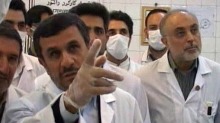Iran brandishes double threat of oil blockade, nuclear advance
 Tehran threatened to cut oil shipments to winter-gripped Europe and boasted of greater nuclear prowess Wednesday, escalating the confrontation with America and other western countries that suspect Iran of covertly developing atomic weapons.
Tehran threatened to cut oil shipments to winter-gripped Europe and boasted of greater nuclear prowess Wednesday, escalating the confrontation with America and other western countries that suspect Iran of covertly developing atomic weapons.“The era of bullying nations has past,” Iran’s President Mahmoud Ahmadinejad warned at an elaborately-staged ceremony in Tehran touting Iran’s enhanced uranium-enrichment capacity. The event also featured the Islamic republic’s first fuelling of a research reactor with an Iranian-made fuel rod.
More worrisome than the fuel rods at an internationally-inspected site were claims of upgrades in Tehran’s murky enrichment program. Mr. Ahmadinejad said there had been “very big new achievement” in putting more than 3,000 additional centrifuges to work.
Although there is no evidence that Iran has done so, arrays of centrifuges would speed any effort to produce highly-enriched, weapons-grade uranium.
Iran’s threat to cut oil exports to European nations – many of which had previously announced they would stop buying oil from Tehran on July 1 – sent a shudder through international oil markets in the wake of initial reports that exports had actually been halted. Oil prices spiked to a six-month high.
Europeans will have only themselves to blame if Tehran looks for new markets for its oil, said Hassan Tajik, a senior Iranian foreign ministry official, after calling in the Dutch, French, Greek Italian, Portuguese and Spanish ambassadors.
“Europe is in a difficult economic condition and is facing a harsh winter,” he said, adding, “We can instantly replace oil customers.”
Washington dismissed Tehran’s newest round of threats as empty posturing. These are “provocative acts, defiant acts, statements that are designed to distract attention from the demonstrated impact that the sanctions are having,” said Jay Carney, President Barack Obama’s spokesman.
Iran, long hostile to the United States which it routinely dubs the ‘Great Satan,’ insists its ambitious nuclear program is entirely peaceful and intended only for power generation and creating medical isotopes.
Unconvinced, the Obama administration has tightened sanctions on Tehran and the two nations have lurched towards armed confrontation in recent months.
Mr. Obama has made it clear he could resort to military force if necessary to prevent Tehran’s ruling mullahs from tipping their missiles with nuclear warheads.
In his latest outburst, President Ahmadinejad denounced the United States, saying “arrogant powers cannot monopolize nuclear technology” and vowed that “our nuclear path will continue. He also announced that the massive, mostly-buried nuclear site at Natanz, would be renamed after Mostafa Ahmadi-Roshan, one of at least four Iranian nuclear scientists assassinated in the last two years. Tehran accuses Israel and the United States of the killings.
His statement came only hours after a new American show of naval power off Iran’s coast. The nuclear-powered aircraft carrier USS Abraham Lincoln, with more than 90 warplanes on board and escorted by guided-missile cruisers and destroyers, sailed through the Strait of Hormuz.
After Iran threatened to close the Straits of Hormuz, the narrow international waterway through which vast flows of oil are exported in a steady stream of hulking tankers, the Obama administration had sent the Lincoln into the Gulf with more than usual fanfare. British and French warships then joined the American battle group to show solidarity.
Small, fast, Iranian naval launches, crewed by special units of Iran’s Revolutionary Guards, routinely harass and shadow American naval battle groups in the Gulf but naval officials said the Lincoln’s most recent transit was unmolested.
After the transit by another of America’s massive aircraft carriers, the USS John C. Stennis in December, Iran’s military chief had warned it should never return.
Canadian warships have, from time to time, deployed with U.S. carrier battle groups in the Persian Gulf and Arabian Sea but Ottawa hasn’t sent a frigate to the region since 2010.
Yet, on a day when the drumbeats of defiance sounded from both Tehran and Washington, there was also, an odd, quiet, indicator that talks might resume.
According to another semi-official Iranian news agency, Tehran has told Catherine Ashton, the European Union’s top foreign policy official, that it is prepared for new nuclear talks with the world’s major powers, including Britain, France, China, Germany, Russia and the United States.
On-again, off-again talks have failed to reach any resolution on bringing Iran’s nuclear activities within an international inspection regime.
You can return to the main Market News page, or press the Back button on your browser.

